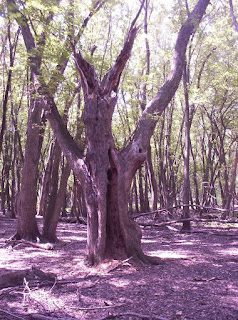
The Eighth Century Chinese Chan (Zen) Master Layman
Pang understood that Buddhist practice does not have a fixed form to be followed by all. But while he is remembered amongst the famous teachers of the past, in my opinion, it was the synergy of the family as a whole that led to such great understanding.
Here is a snippet of their story:
Originally from Hengyang in the southern Chinese province of Hunan, Pang was a successful merchant with a wife, son, and daughter. The family's wealth allowed them to devote their time to study of the Buddhist sūtras, in which they all became well-versed. Pang's daughter Ling Zhao was particularly adept, and at one point even seems to be have been more advanced and wise than her father, as the following story illustrates:
“ The Layman was sitting in his thatched cottage one day [studying the sūtras]. "Difficult, difficult," he said; "like trying to scatter ten measures of sesame seed all over a tree." "Easy, easy," Mrs. Pang said; "like touching your feet to the ground when you get out of bed." "Neither difficult nor easy," Ling Zhao said; "on the hundred grass tips, the great Masters' meaning."[1] ”
After Pang had retired from his profession, he is said to have begun to worry about the spiritual dangers of his material wealth, and so he placed all of his possessions in a boat which he then sunk in a river.
There are so many learnings to be gleaned from this tiny bit of narrative about them. Notice the way material possessions are dealt with. They clearly benefited from having some wealth, given the freed time for Buddhist study it allowed them. In fact, you can take from this that if what you have materially gives you more time to study and practice, then it's beneficial in your life. Yet, at a certain point, there was also a realization that attachment to possessions is commonplace, and a great hindrance, and thus needs to be abandoned. The dramatic sinking of the family's valuables puts one hell of an exclamation point on that teaching, but I do wonder if it might have been more powerful to hear that the Pangs gave their wealth to another family or individual desiring to have time for study and practice. This is one of the challenges I have always had with the heavy emphasis on poverty and material renunciation in the old stories. That works fine for monastics and wandering individuals, but it's unrealistic for most lay practitioners. With that, I still think theirs is an example for all of us today, who struggle with views about both wealth and poverty.
The second learning from this story is the relational quality of practice. This simple story of a father studying the sutras, and a mother and daughter responding to his comments with their own insights is an important reminder to those of us who have been steeped a bit too much in "just sitting" practice. Chan/Zen is relational. Awakening is relational. Whatever wisdom Layman Pang developed over his lifetime and infused into his poems and sayings came together through studies and practice with his family, interactions with his customers (as a merchant), and practice with other Chan teachers of the day. Even if we each must break through the veil covering the truth on our own, it's our relationships (both with humans and with the entire universe of beings) that provide the ground for awakening.
A third learning, which maybe is less apparent, is that if you look closely enough at the old stories, you'll discover brilliance that hasn't been elevated into the traditional canon. We know very little about Ling Zhao, yet her appearance as a young woman of wisdom is just one of many examples throughout old Buddhist stories. And you can bet that for every Layman Pang and Ling Zhao, there were plenty more who lived unrecorded lives, perhaps completely unrecognized outside of the small community they came from.
It tended to be the monastics who were educated, who wrote down the stories, and who passed along what was considered to be the teachings of the day. So, we're left with a partial record of events, persons, and practices - one that privileged monastics, privileged men, and privileged those who had wealth in their lives at some point.
Even so, this doesn't mean we can't uncover some of the wisdom of great lay practitioners of the past. We can. This little story offers a lot, and it's just one of many. Instead of relying solely on the teachings of modern and current practitioners, I think it's wise to dig into the past - to glean what we can from those who came long before us.
